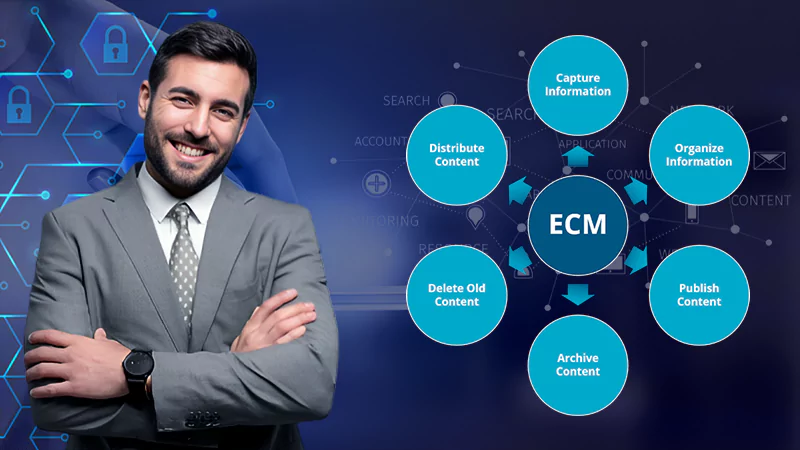The Role of ECM Software in Enhancing Data Security and Compliance

Enterprise content management nowadays propels organizations across various sectors across several levels. The challenges of adhering to evolving regulatory compliance and maintaining robust data security are more pronounced than ever. Enterprise Content Management (ECM) systems have become indispensable tools in navigating these complexities. This article delves into the multifaceted role of ECM software in enhancing data security and compliance, offering a detailed exploration of its capabilities and benefits.
The Digital Revolution and Content Management
With the advent of digital technology, businesses have seen an exponential increase in the volume and types of content they generate and manage. This content ranges from digital documents and emails to multimedia files and more. The transition from paper-based systems to digital platforms, while beneficial, has introduced a new set of challenges. Organizations must now manage sprawling digital content across various platforms, ensuring that sensitive information remains secure and compliance with regulatory standards is maintained.
The Challenges of Compliance and Security in the Digital Age
The evolution of digital landscape has forced several challenges on enterprises:
- Regulatory Complexity: Modern businesses are subject to a myriad of regulations, such as GDPR and CCPA, which mandate strict guidelines for data management and privacy.
- Information Overload: The sheer volume of digital content makes it challenging to manage and secure sensitive data effectively.
- Fragmented Systems: Content scattered across different systems and repositories complicates the enforcement of consistent security and compliance policies.
- Risk of Data Breaches: The digital nature of content increases the risk of unauthorized access and data breaches, posing significant threats to data security.
The Role of ECM in Addressing These Challenges
ECM software offers a comprehensive solution to these challenges by providing centralized control, enhanced security, and streamlined compliance management. Let’s explore how ECM achieves this:
Centralized Control for Compliance Management
ECM systems enable centralized management of disparate content, simplifying compliance with complex laws and regulations. By providing a single point of access to content, regardless of its location, ECM facilitates effective information governance.
Robust Security Features
ECM solutions come with built-in security controls, crucial for safeguarding sensitive documents and ensuring compliance. These features include access controls, encryption, and secure storage, reducing the risk of data breaches.
Comprehensive Audit Trails
Modern ECM solutions offer complete audit trails, recording every interaction with a document. This feature enhances transparency, aids in detecting problems early, and enforces accountability.
Granular Access Control and User Permissions
ECM systems allow for detailed access control, ensuring that only authorized personnel can access sensitive data. This is vital for managing confidential information and complying with data protection regulations.
Automated Records Management
ECM automates the archiving and management of critical information, adhering to specific business and regulatory requirements. This capability is essential for managing data lifecycle and ensuring compliance with retention policies.
Unified Management Across Multiple Systems
ECM provides a cohesive control mechanism over content across multiple systems, addressing the challenges of fragmented systems and ensuring uniform compliance and security protocols.
Management of Diverse Content and File Types
As content types diversify, ECM systems offer solutions to manage this variety while ensuring the enforcement of security measures across all systems, safeguarding corporate and customer information.
Streamlined Document Viewing for Compliance
The integration of web-based content viewers with ECM systems simplifies content access and reduces risks associated with local downloads. This approach aids in maintaining compliance in a digital environment.
Harnessing AI for Enhanced Compliance
AI and Machine Learning technologies are increasingly used in ECM systems to automate complex processes like data redaction, enhancing decision-making and compliance management.
Efficient Documentation Access and Preservation
ECM platforms enable quick access to stored documentation, crucial during audits or inspections, and ensure the preservation of records as per legal requirements, thereby avoiding non-compliance penalties.
Collaboration and Deadline Management
ECM tools foster collaboration and ensure that compliance-related tasks are completed efficiently and on time. They automatically control document expiry dates, alerting management to take necessary actions.
Conclusion:
ECM software is effective in enhancing data security and ensuring regulatory compliance with its multifaceted capabilities. It leverages its centralized content management and advanced security features along with AI integration to benefit modern businesses. As the volume and complexity of digital content continue to grow, the role of ECM in safeguarding data and maintaining compliance will only become more significant, positioning it as a key strategic asset for any organization aiming to thrive in the digital landscape.
Follow Us
Latest Post















